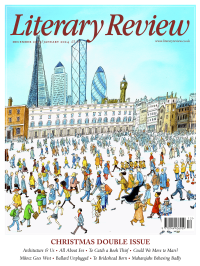Graham Daseler
Tripods at Dawn
The Fatal Alliance: A Century of War on Film
By David Thomson
Harper 448pp £25
When Winston Churchill’s A History of the English-Speaking Peoples was published between 1956 and 1958, Clement Attlee quipped that Churchill should have called it ‘Things in History That Interested Me’. The same might be said about David Thomson’s new book, The Fatal Alliance. Although ostensibly about war movies, the book includes digressions on Robert Falcon Scott, the Antarctic explorer; Henry Rawlinson, the orientalist and so-called father of Assyriology; Night Mail, a 1936 documentary about postal deliveries between London and Scotland; Gulliver’s Travels; Across the River and into the Trees; and Marcel Duchamp’s Nude Descending a Staircase, No 2, painted in 1912. Not that there’s anything wrong with this per se. As he’s demonstrated in his many previous books, Thomson has a capacious mind, stuffed with just about everything there is to know about cinema and plenty else besides. If anyone is capable of covering such an enormous topic – finding the threads that tie together Laurence Olivier’s Henry V (1944) and Quentin Tarantino’s Inglourious Basterds (2009) – it’s him.
The book begins in 1914 and moves forward (with zigs and zags) from there, not by movie but by war. Thus, a discussion of The Life and Death of Colonel Blimp (1943) is followed by discussions of The Dam Busters (1955), Patton (1970) and Saving Private Ryan (1998). Why 1914? Why not, say, 1897, when reporter Frederic Villiers shot the first combat newsreel while covering the Greco-Turkish War? Or, for that matter, why not 480 BC, when the Spartans fought the Persians at Thermopylae – an event that Hollywood has dramatised on more than one occasion? The answer, as Thomson explains, is that after 1914 the public’s understanding of combat changed, in part thanks to the movie camera, which showed how filthy and frightful war could be – nothing like the romantic tableaux painted by Elizabeth Thompson and Edouard Detaille in the previous century. Yet at the same time, advances in military technology meant that war often no longer involved face-to-face combat. ‘We could now kill people at such a distance we need not know it had happened,’ Thomson writes. ‘Does this resemble battle cinema, where strangers in another realm, the screen, are shot down for our fun as we sit in safety?’
That last word is essential. François Truffaut posited that every war film is a pro-war film, because, from the safety of the movie theatre, one can enjoy the frisson of fighting without any of the risk. Thomson makes much the same point but goes a step further, indicting

Sign Up to our newsletter
Receive free articles, highlights from the archive, news, details of prizes, and much more.@Lit_Review
Follow Literary Review on Twitter
Twitter Feed
Though Jean-Michel Basquiat was a sensation in his lifetime, it was thirty years after his death that one of his pieces fetched a record price of $110.5 million.
Stephen Smith explores the artist's starry afterlife.
Stephen Smith - Paint Fast, Die Young
Stephen Smith: Paint Fast, Die Young - Jean-Michel Basquiat: The Making of an Icon by Doug Woodham
literaryreview.co.uk
15th-century news transmission was a slow business, reliant on horses and ships. As the centuries passed, though, mass newspapers and faster transport sped things up.
John Adamson examines how this evolution changed Europe.
John Adamson - Hold the Front Page
John Adamson: Hold the Front Page - The Great Exchange: Making the News in Early Modern Europe by Joad Raymond Wren
literaryreview.co.uk
"Every page of "Killing the Dead" bursts with fresh insights and deliciously gory details. And, like all the best vampires, it’ll come back to haunt you long after you think you’re done."
✍️My review of John Blair's new book for @Lit_Review
Alexander Lee - Dead Men Walking
Alexander Lee: Dead Men Walking - Killing the Dead: Vampire Epidemics from Mesopotamia to the New World by John Blair
literaryreview.co.uk